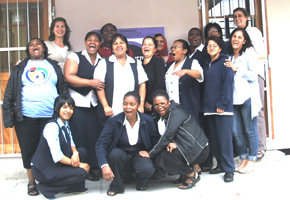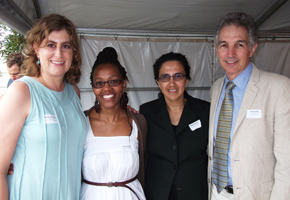Healing mothers in Hanover Park
23 March 2012 | Story by NewsroomOf the 160 pregnant women screened in Hanover Park over the past four months, almost 45% were diagnosed with either anxiety or depression. And of those, almost a quarter were found to be suicidal, that is, thought about suicide.
 |
 |
| Teamwork: The PMHP team with staff at the Hanover Park Midwife Obstetric Unit. | Getting on board: Also at the launch of were PMHP director and founder, Dr Simone Honikman; Sharon Kleintjes, director of psychology at Valkenberg Hospital and PMHP board member; Thabisa Xhalisa, PMHP service beneficiary and PMHP board member; and Dr Max Price. |
These chilling stats came to light at the launch of the UCT-based Perinatal Mental Health Project's (PMHP) research and service site at the Hanover Park Midwife Obstetric Unit. The occasion marked the unveiling of the project's newest kid on the block - its fourth site after Mowbray Maternity Hospital, False Bay Hospital and Retreat Midwife Obstetric Unit.
Initially set up in 2002, the PMHP is a founding partner of the Alan J Flisher Centre for Public Mental Health (CPMH). The CPMH is a joint initiative between UCT's Department of Psychiatry and Mental Health and the Department of Psychology at Stellenbosch University. The PMHP seeks to address mental illness among pregnant women and girls from disadvantaged communities.
And with the addition of the new Hanover Park site - sitting on the intersection of the 'turfs' of three of the Cape's most notorious gangs - the project takes another leap towards making mental health a routine part of obstetric care.
"Women are coming to obstetric services anyway in this country," said Dr Simone Honikman, PMHP Director. "We have a 92% antenatal attendance rate for the whole country. That's great going. We're going to be mercenary and use this opportunity to optimise women's uptake of mental health services."
The aim, adds Honikman, is to generate the best possible evidence-based models for effective low-cost maternity care for the country and "possibly beyond".
The project currently employs mental health screening tools imported from the UK. Although these prove to be successful in research settings, they are too cumbersome to be adopted into the everyday clinical practise of midwives in South Africa.
"A midwife screening 80 to 100 women in a morning doesn't have the time to do an extensive multiple-choice questionnaire," says Honikman.
This is where UCT's core commitment to being a socially responsive Afropolitan university offers solutions to the clinical conundrum, said Vice-Chancellor Dr Max Price, trained as a medical doctor, at the launch.
"The research project has taken technologies, questionnaires and methods of diagnosis that have been developed around the world and that are not appropriate for an African context, has adapted them, is evaluating them, is testing them through research programmes, and I believe will create instruments that will be useful across the continent."
The project also fulfils UCT's promise to answer the needs of local communities, Price added.
"What better way of doing that than moving out of the ivory tours at the foot of Devil's Peak, and moving into Hanover Park and into the communities."
For more about the PMHP's work and programmes; service delivery, research, training and advocacy, visit www.pmhp.za.org. Here, a short film may be downloaded which shows the life and experience of one the project's service recipients.
 This work is licensed under a Creative Commons Attribution-NoDerivatives 4.0 International License.
This work is licensed under a Creative Commons Attribution-NoDerivatives 4.0 International License.
Please view the republishing articles page for more information.










